This Labor Day holiday, ‘special forces travelers’ are flooding popular tourist spots across China. Their mission is clear: covering as many places as possible at the lowest cost and within a limited time. While the travel trend has become a social media hype, there are also those criticizing the trend for being superficial and troublesome.
Social media platforms in China are witnessing the emergence of a new trend in short videos and posts featuring content tagged as “college student special forces” (大学生特种兵).
These posts showcase vloggers’ travels in a particular location, featuring a compilation of photos and video clips of famous tourist destinations. The videos typically begin with the title “College Student Special Forces: 24/48 hours Eating/Exploring [Location]” (大学生特种兵之24/48小时吃/玩遍xx), followed by stylish sentences to provide more context.
The official Weibo account of Sichuan Radio and Television’s Sichuan Observation featured one particular “college student special forces” video that showcased a 24-hour eating tour of Sichuan. The video included photos of various Sichuan dishes, such as Bo Bo chicken (钵钵鸡), tofu pudding (豆腐脑), and shaved ice dessert (冰粉), with succinct commentary such as “[xxx food] has been eaten” accompanying each dish.

This collage features four dishes showcased in the videos. The top row, from left to right, shows ice dessert and bobo chicken; the bottom row features tofu pudding and potato pancake. Screenshots via video.
These videos showcase a new trend in domestic travel called “special forces style traveling.” According to an article by Hongxing News on Weibo, this type of travel is characterized by short durations, visits to numerous tourist spots, low expenses, and excitement.
The article provides an example of this travel style by featuring a college student’s one-day itinerary to Guangyuan in Sichuan. In the itinerary, the student arrives in Guangyuan at 9 am, visits eight tourist spots, and returns to school by 11 pm, spending a total of 202 RMB [$29]. This amount includes the cost of train tickets (111 RMB/$16), entrance fees to tourist spots, local transportation, and meals.
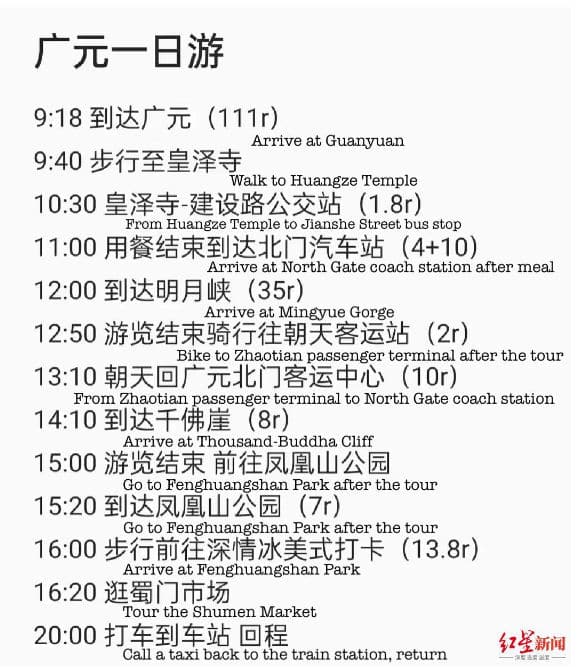
This photo displays the travel itinerary of the college students from the original Weibo article, including the expenses in RMB indicated in the brackets. The author has provided a translation of the itinerary for reference.
This 11-hour travel experience is perhaps only a moderate version of the ‘special forces’ style, which can sometimes be extreme.
According to an article by Toutiao News, two first-year college students left their campus on Friday after class and took a 10-hour train ride to Beijing, arriving at 5:30 am on Saturday. Despite the long journey, they stayed up all night on Saturday to witness the flag-raising ceremony in Tiananmen Square at 3 am on Sunday.
Similarly, one graduate student spent a day at World Studio and then embarked on a late-night climb up Mount Taishan – the highest of the five sacred mountains in China, – at 11 pm on Friday. She then traveled to Jinan at noon for lunch and sightseeing, and headed to Zibo at night for barbecue on Saturday before departing for Beijing at 11 pm.
Remarkably, all of these students managed to return to school in time for their Monday morning classes as usual.
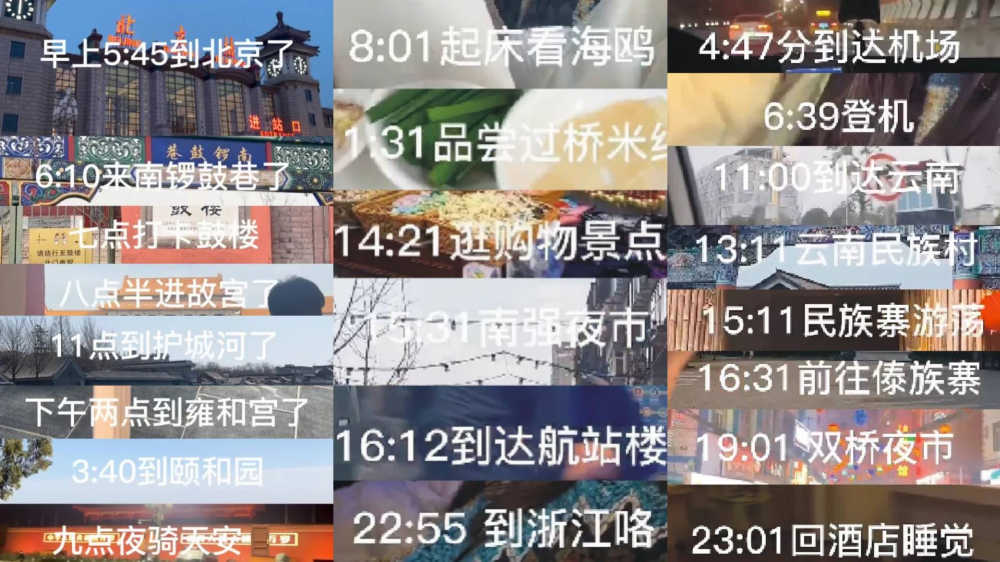
Compilation of posts showing extreme travel schedules, such as: arriving in Beijing at 5:45; 6:10 Nanluoguxiang; 7:00 Gulou; 8:30 Palace Museum; 11:00 moat of the Forbidden City; 14:00 Lama Temple; 15:40 Summer Palace; 21:00 Tiananmen Square.
The rise of the “special forces” style of travel has garnered support from Chinese netizens and media outlets alike.
Xinjing News reports that this approach demonstrates young people’s consideration for time and cost, as well as their ability to adapt to fast-paced environments.
Others also see it as a way for college students to seize the day and build resilience by facing challenges head-on. Local media outlets have also embraced the “special forces” concept as a marketing strategy to promote tourism. They create and promote travel itineraries that showcase all the area’s tourist attractions in under half a minute through short videos.
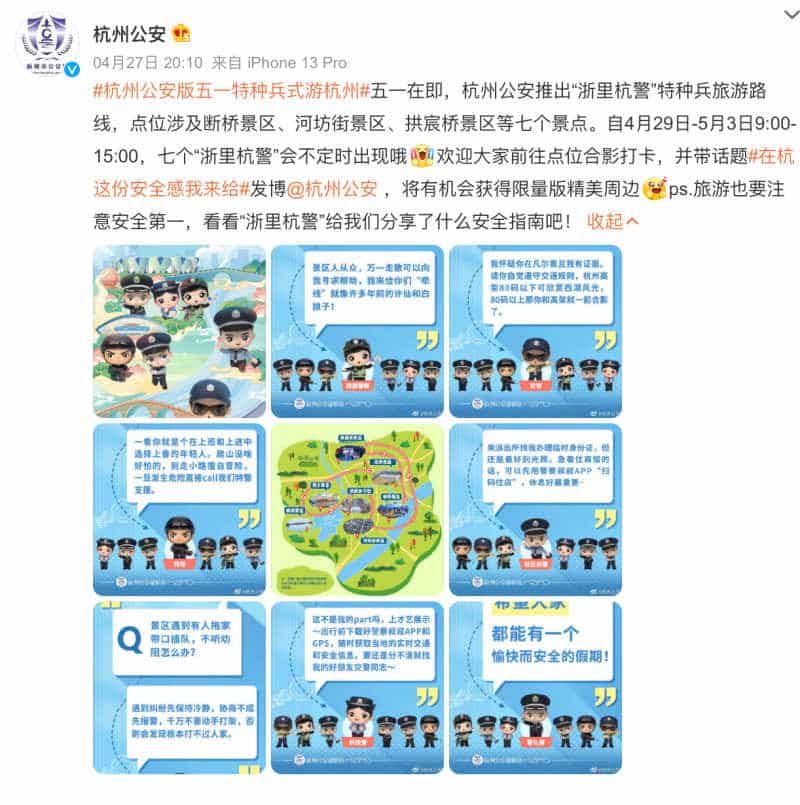
A screenshot from Hangzhou Public Security’s Weibo post on a new “special forces” style travel route that covers seven tourist spots. Tourists are encouraged to meet with the public security forces at each spot in exchange for special gifts from Hangzhou Public Security.
Despite the hype surrounding the trend, there are also concerns and annoyances about this form of travel.
Some think the trend is unhealthy. As a Weibo post by China News Weekly warns, this travel style, with high-intensity exercise and deprivation of sleep, can be be bad for your health (#特种兵式旅游存在健康隐患#).
Others are more annoyed about the “special force” travelers becoming a nuisance to others due to their frugality. One recent viral hashtag was about so many travelers sleeping at the tables of a 24-hour Haidilao hotpot restaurant that they were unable to serve other customers (#海底捞一门店睡满人导致无法用餐#).
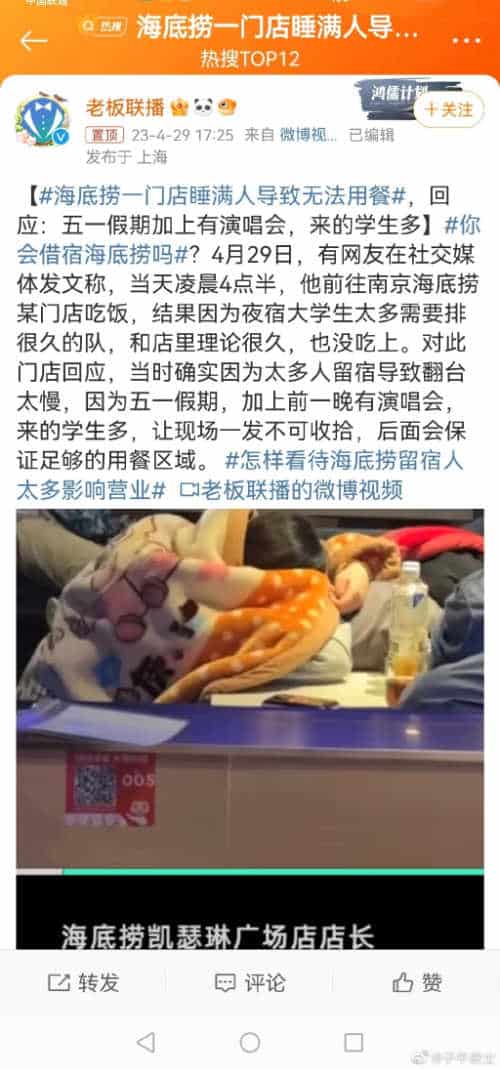
Sleeping at Haidilao.
According to a Weibo post pinned on top of the hashtag page, many college students slept in the restaurant after finishing their meals because of the many performances happening in Nanjing during the Labor Day holiday (五一假期). One Weibo user made a playful comment under the hashtag, joking about the frugality of this type of travel: “It seems like this is a special forces trip after all. The main feature is to simply have a roof over your head.”

A photo from Vista’s Weibo post under the hashtag. Haidilao restaurant customers complain about queuing up at 3 am because of college students sleeping in the shop, showing students’ suitcases outside the restaurant.
Other netizens also question how meaningful this kind of travel style is: does the “special forces” traveler actually experience local culture, or are they just flaunting their travels for social media and skimming over everything without learning anything? The word used is zǒumǎ guān huā (走马观花), which literally means glancing over flowers while riding on horseback: having a superficial understanding from cursory observation.
As one user of the Q&A platform Zhihu comments, this travel style simply enables people to “punch the clock” (打卡, showing to have acquired something new or traveled somewhere) or “clock in” to many places in order to post about it on WeChat or Tiktok: “There is actually no difference compared to to the old travel style of ‘sleeping on the bus, taking photos off the bus’ (上车睡觉,下车拍照)’. Both [kind of travelers] return home with nothing learned.”
Despite raising some criticism, many people view the “special forces” style of travel as a choice made due to limited economic resources and time.
In response to the question, “What does ‘special forces’ style show? Do we forget the meaning of traveling in this fast-paced society?” one Zhihu user explained that for many people, their limited time and financial resources prevent them from fully realizing the meaning of traveling: “Taking a vacation means having to make up for missed workdays, and even working hard doesn’t bring in much money. The workload is so heavy that if you can take a break and have some fun, that’s already pretty good. Meaningful travel…that belongs to the wealthy.”
On the other hand, another Zhihu commenter also challenges the idea of “meaningful travel” by claiming that the so-called “meaning” of travel is a subjective experience: “Any experience is a good experience when you’re young, as long as it’s not illegal or dangerous. Why would others want to ruin their excitement?”
“Only you can add meaning to your travels,” another commenter writes: “The ‘special forces travel’ is fresh, and it’s fun (..) Don’t dive in too much on whether it’s meaningful or not. There’s so many different ways of things being meaningful. For many things, it’s just about doing it, and if you like it, then you keep doing it and otherwise you stop. It’s basically what life is all about.”
By Zilan Qian
Get the story behind the hashtag. Subscribe to What’s on Weibo here to receive our newsletter and get access to our latest articles. Follow us on Twitter here.
Spotted a mistake or want to add something? Please let us know in comments below or email us. First-time commenters, please be patient – we will have to manually approve your comment before it appears.
©2023 Whatsonweibo. All rights reserved. Do not reproduce our content without permission – you can contact us at info@whatsonweibo.com
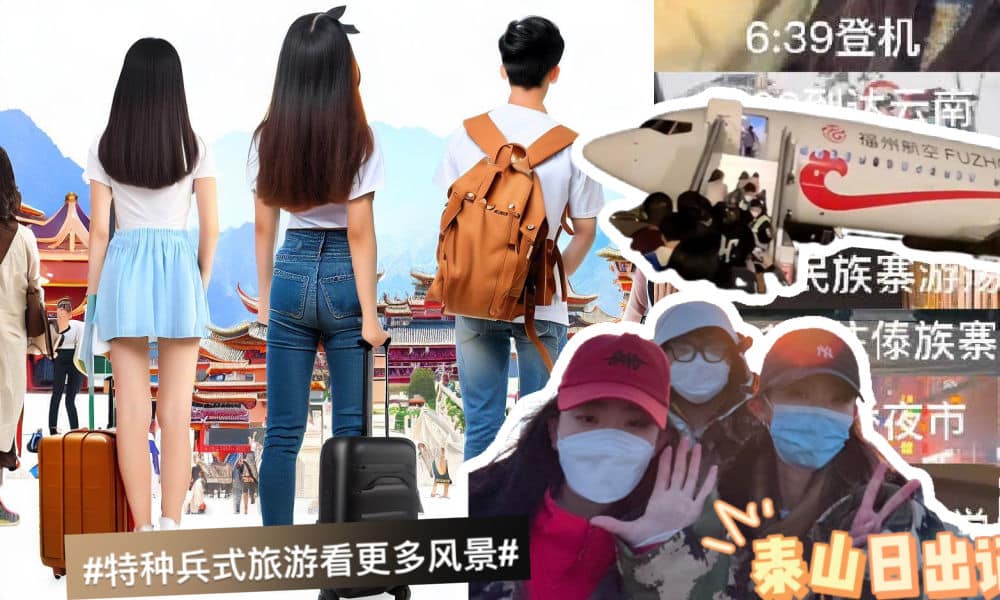

 China Insight11 months ago
China Insight11 months ago
 China Digital10 months ago
China Digital10 months ago
 China Arts & Entertainment11 months ago
China Arts & Entertainment11 months ago
 China Arts & Entertainment12 months ago
China Arts & Entertainment12 months ago













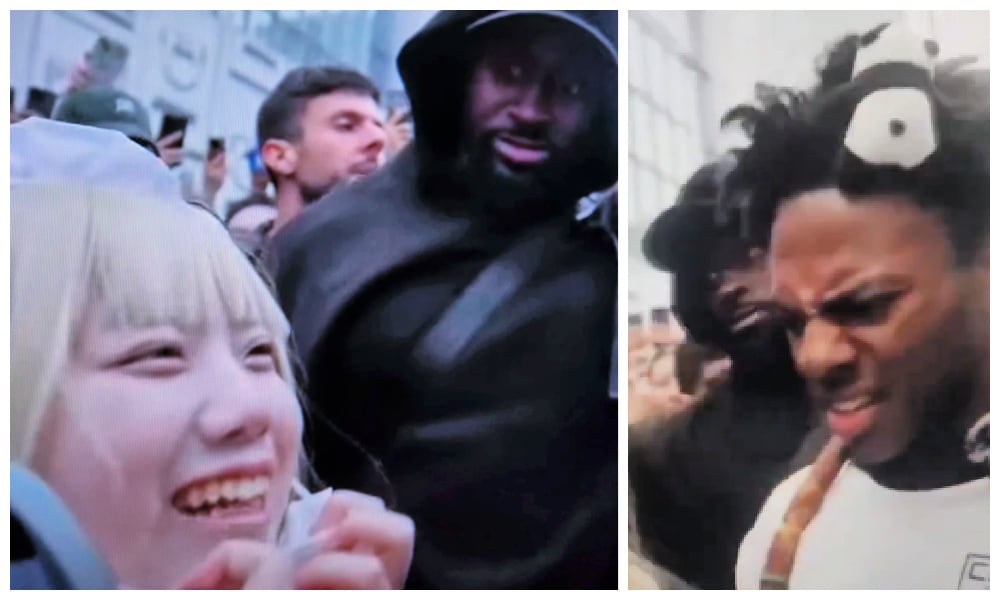


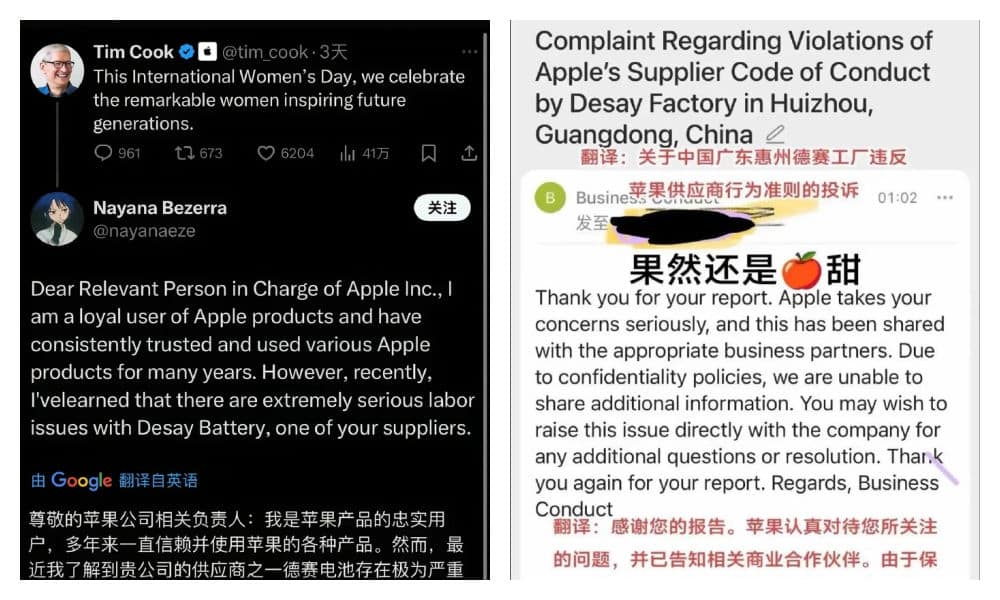















Tom
May 7, 2023 at 8:10 pm
Reminded me somehow of the 1964 JP Belmondo movie L’homme de Rio, minus the narcissistic component of today. Or would these youngsters do these trips, this (IMO boring) gamification of travel, if they had no way of bragging about it? An honest question, to a degree, because I seriously don’t care what they do.